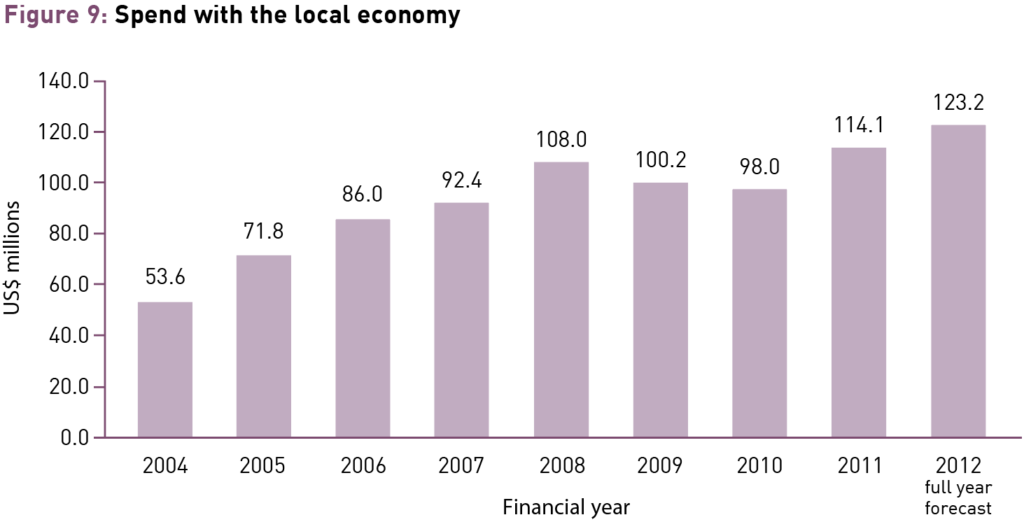Summary
One of the most significant contributions that a large mining company can make to society is an economic one. By investing in the local private sector, a company provides the local community (including employees who work for local businesses) a reason to value the mine’s presence, enhancing its social licence to operate.
Context and challenge
Located in Maputo in southern Mozambique, BHP Billiton’s Mozal aluminium operation was the first major development in the country in the past 50 years and it quickly accounted for more than 45% of imports and 7% of gross domestic product (2002 figures). In 2007, aluminium exports contributed 61.4% of the total exports value and in 2010, Mozal’s aluminium ingots still accounted for over half of the export earnings in Mozambique. To date, Mozal continues to rank first place on the top 100 companies in the country
(KPMG 2010 Top 100 Companies in Mozambique).
A 17-year civil war had devastated Mozambique and its physical and economic infrastructure. There were few local businesses that could provide the new smelter with essential goods and services. Development of a local supply chain was therefore imperative. Commencing with a commitment to award as much work as possible to local suppliers, the focus of development support programs is to help small and medium businesses improve their skills and capacity, with a view to building a local base of strong, competitive and sustainable supplier companies.
Response
Initially, a program was developed to educate and train the newly formed small and medium-scale enterprises (SMEs) on an international-standard tendering package, allowing them to compete for business against foreign companies. Work packages were exclusively allocated to local companies. This was undertaken without compromising the principles of compliance to specifications, timely delivery or safety.
The materials and services identified for procurement from local companies included stationery, transport labour, vehicle rental, signage, labour rate agreements, minor civil work, equipment surveys, manufacturing, small tool repairs, lifting services, hardware and software services, vehicle service and maintenance, laboratory consumables and hand tools.
Services that could be undertaken with low risk to the operation were selected to participate in the program in the initial stages; then the range was expanded as local capabilities developed.
In parallel, the company established the “MozLink” program and built an SME Development Centre. Through the program, Mozal builds SME capacity, shortens the supply chain, minimizes cross-border complexities and reduces lead times, which in turn leads to lower stock levels and cost savings for the company. The MozLink program aims to create stronger and more competitive SMEs, transfer knowledge and capacity, and assist Mozambican companies to grow and develop into strong organizations that can compete in both local and international markets.
The MozLink process is to:
- identify, introduce and develop suitable suppliers
- create a Mozambican supplier database
- identify materials and services to be procured exclusively from Mozambican companies
- implement training and development programs for SMEs and • build co-operative relationships.
MozLink is a win-win for the corporations, for SMEs and the overall community. More than 150 SMEs were developed through MozLink I and II creating more than 3,000 jobs. The success of the MozLink program has encouraged other large organizations to join the initiative, which will converge to MozLink III set up to start early July 2012. A further 80 SMEs are expected to take part in this phase.
Outcomes and lessons learned
Since the beginning of operations at Mozal, the number of packages awarded to local companies has progressively grown. In 2004, an average of around US$4 million was being spent per month with Mozambican registered companies. In 2011, this figure has more than doubled, contributing to more that US$110 million to the local economy annually. Figure 9 shows the history of expenditure with local companies between 2004 and 2011. It is expected that a further US$123 million will be spent in the local economy during the financial year 2012. This approach provides SMEs with opportunities for information sharing that can extend their marketplace, facilitate access to useful data, accelerate growth, introduce best practice information systems and bring demand and supply together. Overall, the development of SMEs has ensured a stronger supply chain, development of local capacity and local availability of products and services.


